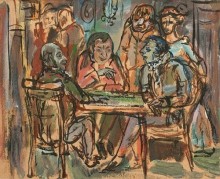Taras Shevchenko and Nikolai Gogol are the two Ukrainian geniuses of the 19th century (and, maybe, of all times). These artists can and must be put in the same category of meanings in spite of very essential philosophical, ethical, and political differences in their oeuvre and in the spiritual universe that they created with their incomparable imagination. What unites both of them is Ukrainian vision of the world and God in it. Although Gogol chose the Russian language as an instrument to creatively realize his genius, his “Ukrainianness” forced its way through the “imperial Petersburg ice” until the last days of his life. Shevchenko was quite right to regard Gogol as his spiritual confrere (“One must revere Gogol.” Shevchenko wrote in a letter to Varvara Repnina).
Just think of it, reader: the so-called “mature” Gogol (a strange definition – when was he “immature”?) wrote, from 1835 onwards, almost exclusively about Russia, its people, and the moral reference frame in Russian society, not about Ukraine. But clever contemporaries of the author of Dead Souls, such as Pogodin, Aksakov, Belinsky, Shevyriov, noticed that a “pure” ethnic Russian (with all the lyrical odes to Russia and “troika birds” which Gogol’s inspired pen created) would have never (!) created such a strange (frankly speaking, awful, as, for example, Pushkin and Herzen understood) figure of the Russian world and Russian man in The Government Inspector and Dead Souls. This figure is the product of a look from the person of a different (Ukrainian) spiritual world, a look that loves, hates, and is devilishly precise.
Here are just a few examples. In The Government Inspector, Gogol (a 26-year-old youth in fact) evolved an “eternal,” brilliant formula of the Russian imperial setup. The mayor says to the merchant who prostrated himself before him: “Look, you take more than your rank allows you.” That’s it. This is enough for one to understand: “to take” “according to your rank” is a guarantee of success in this society. Does this mean that Gogol is no other than a hardcore Russophobe? Another phrase from the same play – “I can’t see anything, I can’t see people, just some pig snouts instead of faces” – is absolutely not funny, it is horrible because it is true. And here is a “tiny detail” (Gogol has no trifles at all, which is the particularity of his genius): in Dead Souls, the one who rides on a Russian “troika bird” is none other than the scoundrel and fraud Chichikov!
Gogol loved Russia but looked at it with Ukrainian eyes all his lifetime. His laughter is frightening because he was not afraid to see devilish principles in the country, in the world, and in himself. But, in spite of everything, he sincerely believed to the end that the aim of an individual’s life is not to fill his stomach but to be a free citizen of the Kingdom of Heaven. His Bulba is free, even though Gogol was forced to put the exaltation of the Moscow tsar into his lips. Gogol himself also struggled for the freedom of his genius. This is why we have no right to give to any other country – be it Russia or Italy – one of the all-time greatest Ukrainians who had an exceptional impact on 19th- and 20th-century world literature – from Bulgakov to Dostoevsky, from Kafka to Camus, from Japan to France.







